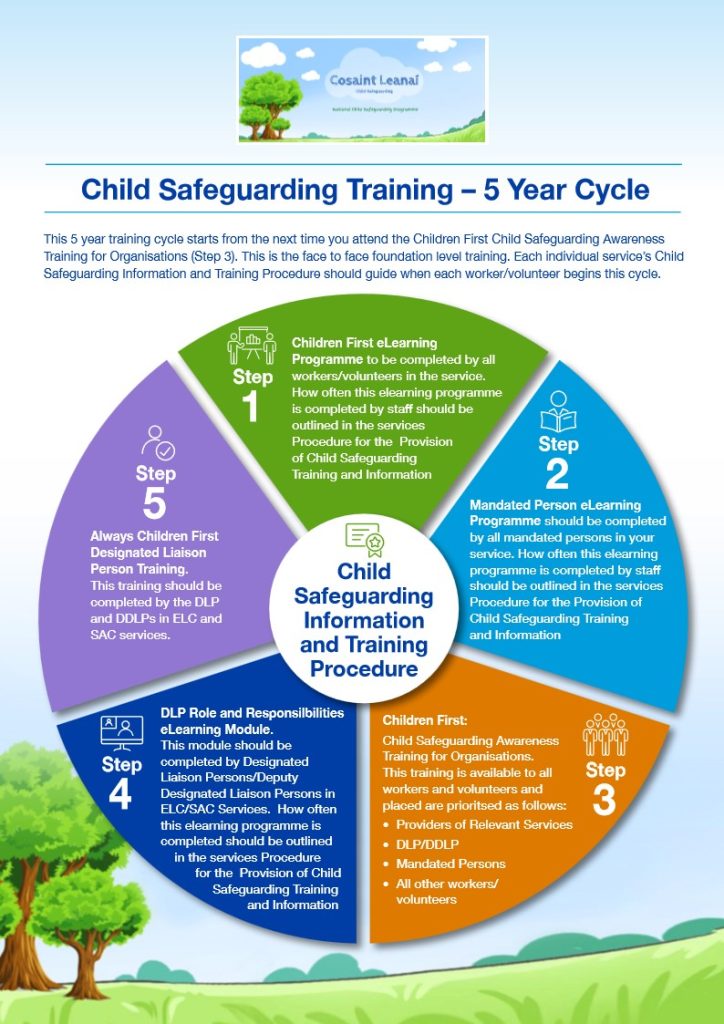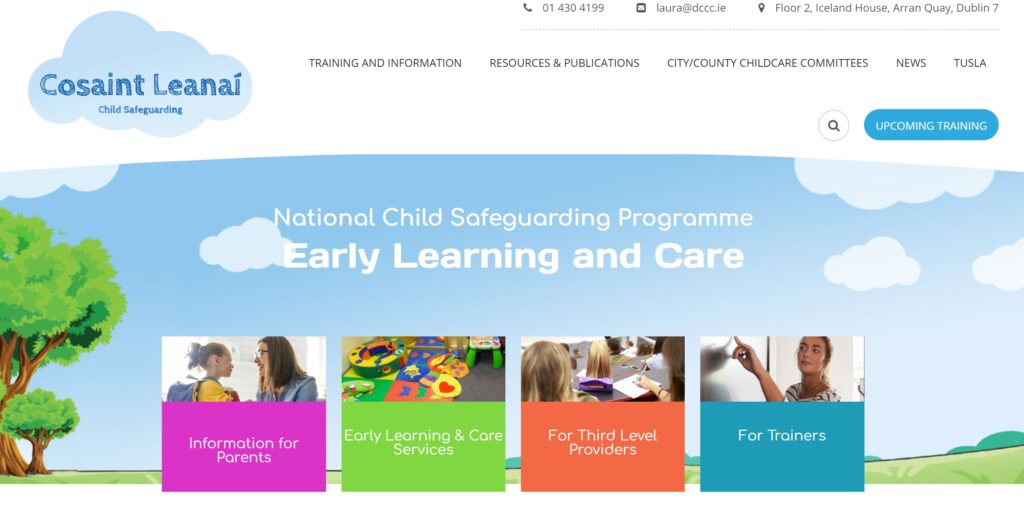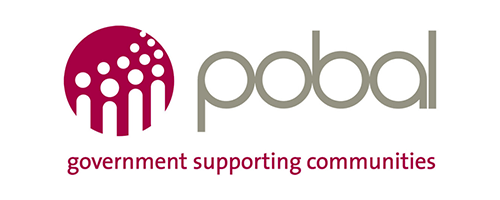
Children First National Guidance for the Protection and Welfare of Children 2017 provides the national guidance for the protection and welfare of children in Ireland.
A child is defined under the Child Care Act 1991 as anyone under the age of 18 years who is not, or has not been married.
It states what organisations need to do to keep children safe, and what different bodies and the general public should do if they are concerned about a child’s safety and welfare.
Tusla Child and Family Agency
Tusla Child and Family Agency has a legal responsibility under the Childcare Act 1991 to promote the welfare and protection of children.
Children First Act 2015
The key provisions in the Act that will affect early years’ services are:
- Legal Obligation on ‘Mandated Persons’ to report child protection concerns and child abuse over a certain threshold to Tusla
- Requirement to have a Child Safeguarding Statement
Commenced in full on December 11th, 2017
Mandated Persons
In early years’ settings you are a Mandated Person if you are:
- A person carrying on a pre-school service within the meaning of Part VIIA of the Child Care Act 1991.
- A child care staff member employed in a pre-school service within the meaning of Part VIIA of the Child Care Act 1991
Mandated persons have two main legal obligations under the Children First Act 2015:
- To report harm of children, above a defined threshold, to Tusla
- To assist Tusla, if requested, in assessing a concern which has been the subject of a mandated report
The National Child Safeguarding Programme; Early Learning and Care
The National Child Safeguarding Programme; Early Learning and Care was set up in 2012 following a number of developments in the Early Years Sector, including the establishment of the Department of Children and Youth Affairs in 2011 and the launch of the updated publication of Children First: National Guidance for the Protection and Welfare of Children, also in 2011. The Children First National Guidance was fully revised and published in 2017 to include reference to the Children First Act 2015. The Committee was developed with the primary aim of addressing the implementation of Children First in the Early Years Sector.
The Committee is charged with coordinating the delivery of Child Protection Training nationally in a consistent approach. Thus a Sectoral Training Plan was developed under four headings:
- Training
- Communication
- Policy & Procedure
- Quality Assurance
The National Child Safeguarding Programme; Early Learning and Care website www.childsafeguardingelc.ie is full of Early Learning and Care sector specific child safeguarding training and resources, which were developed in conjunction with Tusla. It is a ‘one stop shop’ for all Child Safeguarding resources for Early Learning and Care Services in Ireland as detailed below. You can also follow them onTwitter at @safeguardingelc
The website includes:
- Information for Early Learning and Care and School Age Childcare services including all relevant Child Protection resources and publications.
- Information for Parents section which includes an Information Leaflet for Parents on Child Safeguarding in Early Learning and Care services.
- Information for Third level providers
- Information on Child Protection training
Updated Child Safeguarding Statement Template and Information Sheet
Included on the website is the updated Child Safeguarding Statement Template and accompanying Information Sheet for Early Learning and Care services. This resource has been developed in conjunction with the Tusla Child Safeguarding Statement Compliance Unit and will help services to develop a strong, robust Child Safeguarding Statement that is individual and unique to their service. The template and accompanying information sheet attached outlines the exact steps that services are required to follow to develop their Child Safeguarding Statement.
A Child Safeguarding Statement is a written statement that specifies the service being provided and the principles and procedures to be observed in order to ensure, as far as practicable, that a child availing of the service is safe from harm. Upon completion, the Child Safeguarding Statement must be shared with all staff members, displayed in a prominent place in the service and made available to parents and guardians, Tusla and members of the public upon request.
Further information can be found here https://www.tusla.ie/children-first/organisations/what-is-a-child-safeguarding-statement/
Click on the documents below to view the updated Child Safeguarding Statement and Information Sheet:
Child Safeguarding Training
For further information on Child Safeguarding in Early Learning and Care services visit http://childsafeguardingelc.ie/

Children First Foundation Training
In order to sign up for the Children First Foundation Training it is a requirement of Tusla that all participants complete their online e-Learning within one year of attending the CF training. If you are a mandated person as per schedule 2 of the Children First Act which states a”(j) child care staff member employed in a pre-school service within the meaning of Part VIIA of the Child Care Act 1991 or a person carrying on a preschool service, then you will also need to complete the mandated person online training prior to attending the CF Foundation training. Please note Staff and Operators of school aged childcare services are not included in schedule 2 and therefore are not mandated persons.
A prerequisite of attending this training is that participants have completed the Tusla online Introduction to Children First e-Learning Programme plus the Tusla online Mandated Person e-Learning (ELC services only need to submit their Mandated Person cert). Cert must be in date within 1 year from date of training you wish to attend. Wicklow CCC require a copy of both of these certs at time of booking.
Dates for our next Foundation training will be announced in Autumn 2024.
Introduction to Children First e-Learning module
Tusla has worked with the Department of Children, Equality, Disability, Integration and Youth and the HSE to develop a universal e-learning programme called ‘Introduction to Children First’. The programme has been written to support people of all backgrounds and experience in recognising concerns about children and reporting such concerns if they arise.
- Recognising and reporting child abuse;
- The role of mandated persons;
- The responsibilities of organisations working with children to safeguard children;
- The role of designated liaison persons.
You will need to create an account using an email address to log in and complete the progamme. This allows you to complete the training gradually over time. Once you have created your account, launch ‘An Introduction to Children First’. When you have completed the programme, you will receive a certificate of completion directly to your email address.
Mandated Person e-Learning module
Tusla are pleased to launch a new eLearning module for mandated persons. This eLearning module has been developed to provide information on, and understanding of, the role and responsibilities of mandated persons as outlined in the Children First Act 2015.
The key learning outcomes of the Tusla Children First Mandated Person: Role and Responsibilities eLearning Module for the learner are to;
- Understand a mandated persons legal responsibilities.
- Be aware of the definitions and thresholds for mandated and non-mandated reports.
- Know how to make a report to Tusla.
- Understand mandated assisting and the process involved.
- Understand the mandated persons role to liaise and communicate with Tusla.
This eLearning module will take the participant approximately 60 minutes to complete.
As this eLearning module was developed to continue the learning journey of the mandated person, we recommend that the mandated person firstly complete the Tusla Children First eLearning programme as an introduction to Children First and to the role of the mandated person. The mandated person and all other staff, workers or volunteers may also wish to avail of the Tusla National Approach to Practice – Signs of Safety briefing
Designated Liaison Person
This DLP eLearning module is universally accessible. There is no certificate available for this eLearning. For those who require evidence of completion, it is suggested that you screenshot the completion-page. In order to get the full benefit from this module, you should have already completed the “An Introduction to Children First” eLearning programme.
Both public and private organisations that are providing services to children should consider appointing a designated liaison person in keeping with best practice in child safeguarding. This person will be the resource person for any staff member or volunteer who has child protection concerns and will liaise with outside agencies. The designated liaison person should be knowledgeable about child protection and should be provided with any training considered necessary to fulfil this role.
The designated liaison person is responsible for ensuring that reporting procedures within your organisation are followed, so that child welfare and protection concerns are referred promptly to Tusla.
The name and contact details of the designated liaison person should be made available to all staff and volunteers working within your organisation. It may also be useful to appoint a deputy designated liaison person who will assume responsibility when the designated liaison person is not available or on leave.
Resources & Publications
A comprehensive list of all safeguarding related resources and publications can be found on the National Child Safeguarding website



